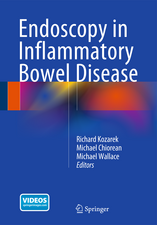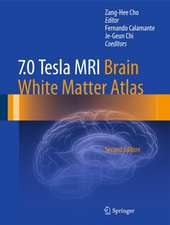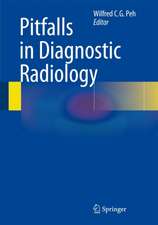Chest Imaging: An Algorithmic Approach to Learning
Autor Les R. Folioen Limba Engleză Paperback – dec 2011
Preț: 360.14 lei
Preț vechi: 379.09 lei
-5% Nou
Puncte Express: 540
Preț estimativ în valută:
68.93€ • 74.90$ • 57.94£
68.93€ • 74.90$ • 57.94£
Carte tipărită la comandă
Livrare economică 21 aprilie-05 mai
Preluare comenzi: 021 569.72.76
Specificații
ISBN-13: 9781461413165
ISBN-10: 1461413168
Pagini: 147
Ilustrații: XVII, 147 p. 123 illus., 58 illus. in color.
Dimensiuni: 155 x 235 x 13 mm
Greutate: 0.2 kg
Ediția:2012
Editura: Springer
Colecția Springer
Locul publicării:New York, NY, United States
ISBN-10: 1461413168
Pagini: 147
Ilustrații: XVII, 147 p. 123 illus., 58 illus. in color.
Dimensiuni: 155 x 235 x 13 mm
Greutate: 0.2 kg
Ediția:2012
Editura: Springer
Colecția Springer
Locul publicării:New York, NY, United States
Public țintă
Professional/practitionerCuprins
Introduction.- Search Pattern.- Normal Chest X-Ray.- Abnormal Lung Patterns.- Abnormal Pleura.- Abnormal Mediastinum.- Abnormal Bones, Soft Tissue and Other Findings.-
Notă biografică
Col. Les Folio, a retired air force radiologist and flight surgeon with over twenty years of service, presents a comprehensive introduction to diagnostic imaging technology.
Textul de pe ultima copertă
Chest Imaging offers a concise introduction to radiographic chest procedures through a methodical, pattern-driven approach. Filled with high-resolution images, this practical guide provides a thorough explanation of key terms, concepts, and procedures useful for medical students, radiology residents, and others to learn the basics of the plain film chest x-ray (CXR). The book includes a companion online resource at www.robochest.com designed for use in combination to provide students with numerous examples of clinically significant abnormalities commonly detected on CXRs. Chapters present a structured lexicon to teach students to reproducibly describe radiographic abnormalities of the chest detected on CXRs. Topics present specific combinations of distinct radiographic findings in relation to classes and groupings of pathological etiologies of those findings. Recognizing individual findings and identifying their combination or lack of combination with other findings allows students to learn effective differential diagnoses. Chest Imaging includes hundreds of radiographs, CTs, graphics, mnemonics, differentials, and analogous models to help teach otherwise complex processes and radiographic principles.
Caracteristici
Presents a structured lexicon for use by readers Provide readers with clinically significant differentiation of abnormalities detected Content is structured to relate specific combinations of distinct radiographic findings to classes/groupings of pathological etiologies









